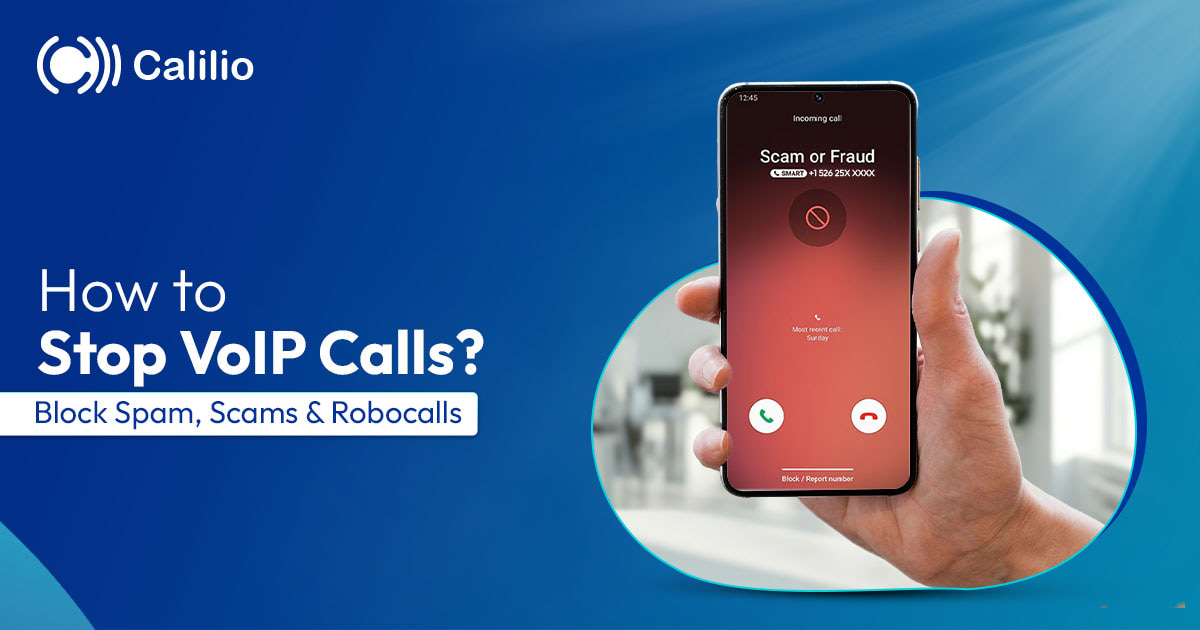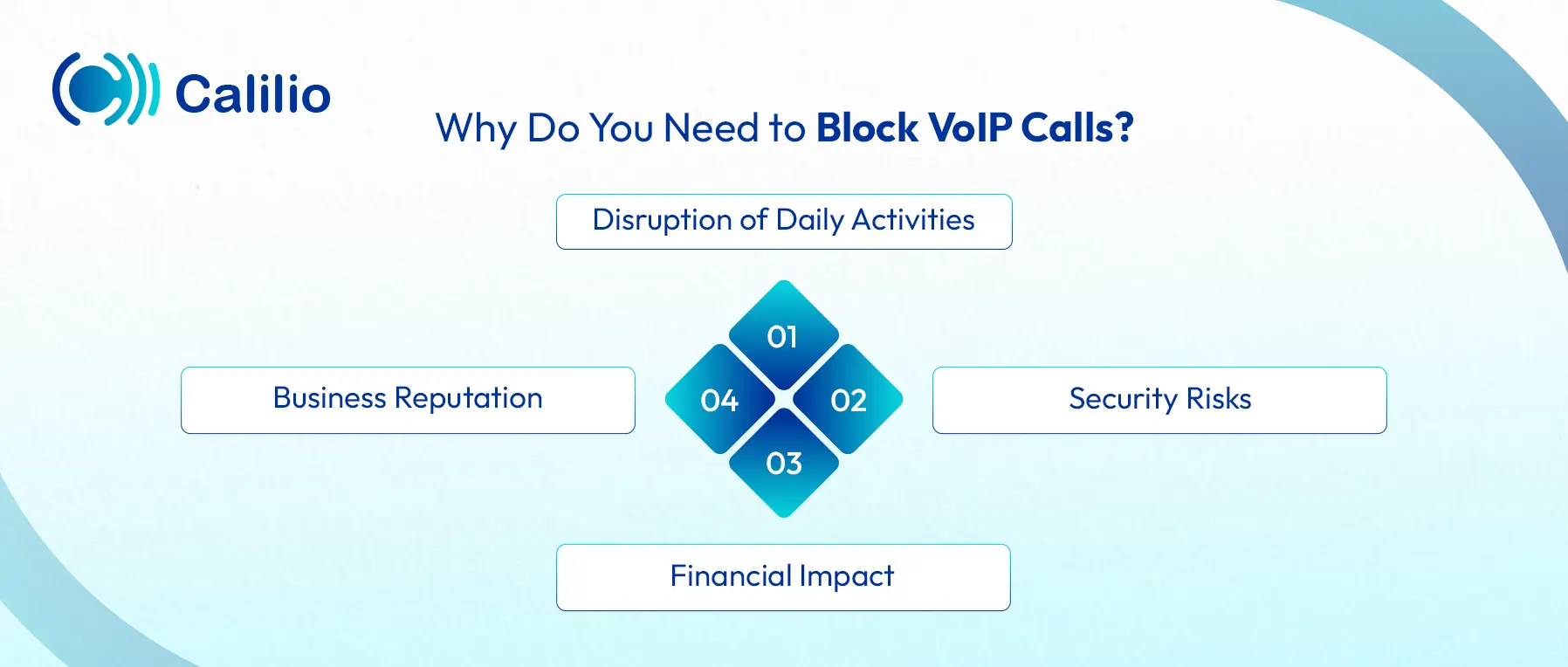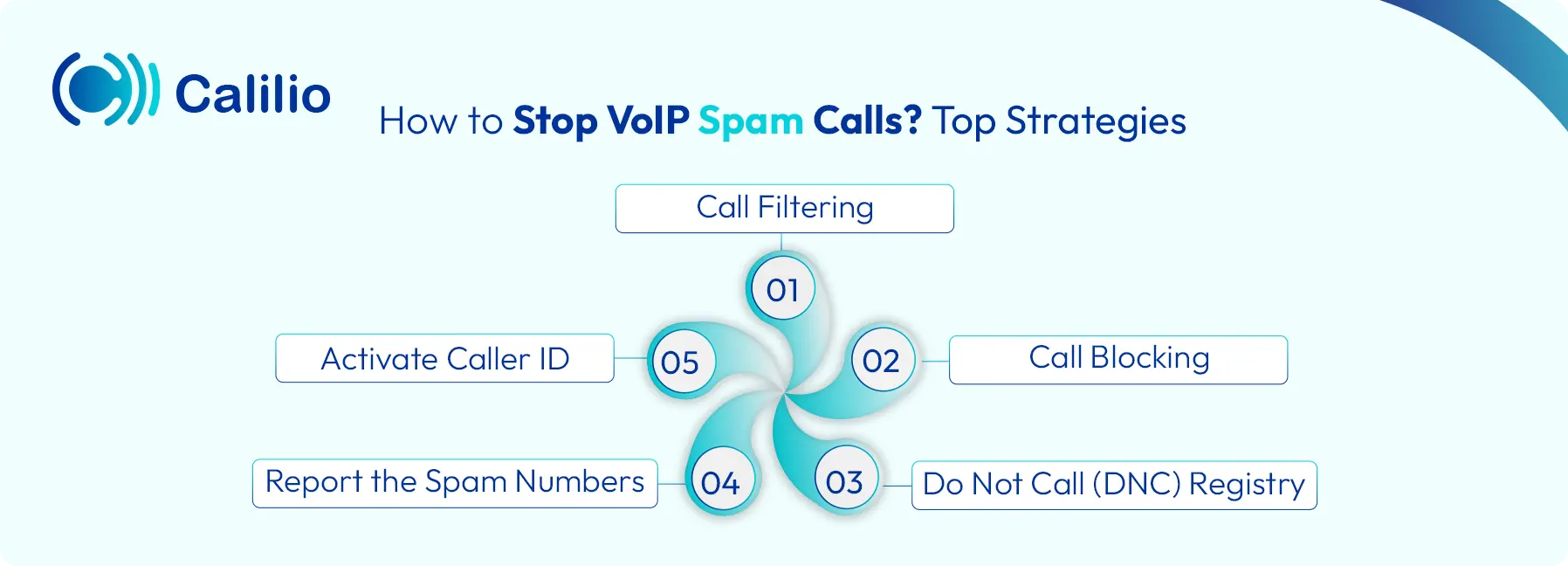How to Stop VoIP Calls? 5 Effective Ways

VoIP has transformed the way we communicate, offering cost savings, flexibility, and advanced features for both personal and business use. However, this convenience comes with a downside: unwanted VoIP calls. Spam, scam, robocalls, and phishing attempts are increasingly common, disrupting daily life and posing security risks.
In this guide, we’ll show you how to stop VoIP calls, explore the different types of unwanted calls, and provide practical strategies to protect your time, privacy, and business reputation.
Key Highlights:
VoIP has made communication cheaper and more flexible, but it has also opened the door to financial and data risks.
Unwanted VoIP calls can disrupt daily routines, lower work productivity, and even put your security at risk.
Spam calls, scam calls, robocalls, phishing attempts, and international toll fraud calls are different types of unwanted VoIP calls.
You can protect yourself by using tools such as spam filters, call screening, and call blocking lists. Additionally, you can also report the spam calls and register your number on the Do Not Call Registry (DNCR) to prevent future unwanted calls.
Why Do You Need to Block VoIP Calls?
 Unwanted VoIP calls are more than just annoying, as they can waste time, compromise security, and damage business operations and reputation.
Unwanted VoIP calls are more than just annoying, as they can waste time, compromise security, and damage business operations and reputation.
1. Disruption of Daily Activities
Spam and robocalls can break your concentration during work, study, or personal time. A single interruption may seem small, but repeated calls drain productivity and increase stress. For individuals, it creates frustration, while for businesses, it reduces the efficiency of employees when they’re required to constantly deal with irrelevant calls.
2. Security Risks
One of the biggest threats to VoIP calls is caller ID spoofing. Fraudsters disguise their identity and pretend to be from trusted organizations. They can impersonate banks, government agencies, or even your own company. By sounding convincing, they trick people into sharing passwords, financial details, or other confidential information.
4. Financial Impact
VoIP spam calls can result in unexpected costs. Some scammers use tactics like international toll fraud, where your system is tricked into connecting to premium-rate numbers. Every unauthorized connection contributes to your bill, leading to significant financial losses for businesses and individuals alike.
4. Business Reputation
For companies, spam calls don’t just waste time; they also affect customer service. If agents spend too much time filtering junk calls, real customers wait longer in queues, which hurts service quality. Over time, this frustration can damage your reputation and make customers question your reliability.
What are the Different Types of Unwanted VoIP Calls?
The various types of unwanted VoIP calls include spam calls, robocalls, scam calls, phishing calls, and international toll-fraud calls. Each type of these calls comes with its own risks and tricks.
1. Spam Calls
Spam calls are unwanted promotional calls that attempt to sell products, services, or offers you never asked for. These calls are often generated by automated dialers that target thousands of numbers in seconds.
Example: You answer the phone and hear a message promoting a credit card or insurance plan you never showed interest in.
Why it’s a problem: They waste your time and make you hesitant to pick up calls from other unknown numbers, which may be legitimate.
2. Robocalls
Robocalls deliver pre-recorded messages through calls instead of connecting to live agents. They’re cheap for scammers because one recording can be sent to millions of people. You must adopt precautions to stop robocalls and avoid falling victim to fraud.
Example: A robotic voice warns you about “urgent action required on your tax account” or announces that you’ve won a fake lottery.
Why it’s a problem: They often carry scare tactics or irresistible offers, tricking people into calling back or pressing keys that lead to scams or data theft.
3. Scam Calls
Scam calls are more dangerous because they involve real people pretending to be someone they’re not. Scammers use caller ID spoofing to look like a bank, government office, or even your own workplace.
Example: A caller claims they’re from your bank’s department and asks for your card details to “verify your identity.”
Why it’s a problem: These calls are designed to steal money or sensitive information, often using trust and urgency to pressure you.
4. International Toll Fraud
This is a less obvious but costly attack. Scammers exploit VoIP systems to make calls to high-cost international or premium-rate numbers. The charges appear on your bill, even though you never made the calls.
Example: Your business VoIP system is hacked, and suddenly you’re billed for hundreds of calls to overseas numbers you don’t recognize.
Why it’s a problem: It causes huge unexpected bills and is harder to detect until it’s too late.
5. Phishing Calls
A newer type of VoIP scam, phishing calls, combines spam and scam techniques. Attackers call pretending to be from trusted companies and direct you to a fake website or request login details.
Example: “This is PayPal support. Please visit this link to reset your account."
Why it’s a problem: It leads to account takeovers, stolen passwords, and data breaches.
Stop Spam Calls in Their Tracks—Upgrade to a Smarter Business Phone System Today!
How to Stop VoIP Spam Calls? Top Strategies

To stop VoIP spam calls, activate call filtering and call blocking to detect and block unwanted numbers and repeated callers. Additionally, register your number on the Do Not Call Registry, report spam numbers to providers and regulatory authorities, and activate caller ID to identify and avoid suspicious or anonymous callers.
1. Call Filtering
Call filtering is one of the most effective strategies for blocking VoIP calls. It allows you to screen incoming calls based on specific rules such as caller ID, area code, or call frequency. By applying these filters, you can automatically block suspicious or unknown numbers before they disturb you.
Many VoIP services also provide advanced filtering options that identify and stop known spam or robocall patterns. Using call filtering not only reduces unwanted interruptions but also ensures that other legitimate calls from trusted contacts reach you without delay.
2. Call Blocking
Call blocking is a simple yet powerful strategy for stopping unwanted VoIP calls. It allows you to permanently block specific numbers that repeatedly disturb you with spam or scams. Once a number is blocked, it cannot reach you through calls or, in many cases, even text messages.
Modern VoIP systems also include automatic blocking features that identify known spam numbers from a global database. By using call blocking, you gain control over who can contact you and reduce the risk of falling victim to fraudulent calls.
3. Do Not Call (DNC) Registry
Registering your number on the Do Not Call (DNC) list is another effective strategy for reducing unwanted VoIP calls. The list is designed to protect consumers from unsolicited marketing and sales calls.
Telemarketers are legally required to avoid calling numbers listed on the registry, which helps cut down promotional and spam calls. While it may not stop every scammer, it significantly lowers the volume of nuisance calls and adds a protective layer to your communication.
4. Report the Spam Numbers
Reporting spam numbers is an active way to fight back against VoIP spam and scams. When you report a number, your service provider or regulator can flag the number, investigate, and take action to prevent further misuse. This not only protects you but also helps other users avoid calls from the same number. Over time, consistent reporting contributes to a safer communication network for everyone.
5. Activate Caller ID
Activating caller ID is a smart strategy to identify and avoid unwanted VoIP calls. Caller ID shows you the number or name of the person trying to reach you, allowing you to decide whether to answer, ignore, or block the call. Many VoIP services also offer advanced Caller ID options that can flag spam and block spam-like numbers automatically.
Additional Tips for Secure VoIP Use
Even after blocking spam calls, your VoIP system can still face risks. These extra steps keep your communication safer and more reliable.
1. Keep VoIP Software Updated
Always make sure your VoIP app, desk phone firmware, and connected devices run the latest version. Updates are not just about new features; they often fix hidden security holes that hackers can exploit.
- For businesses: Schedule regular system-wide updates and test new versions in a safe environment first.
- For individuals: Turn on auto-updates in your phone or app settings.
2. Enable Two-factor Authentication (2FA)
Passwords alone are not enough. If attackers steal or guess them, they can hijack your VoIP account. Adding 2FA (like a code sent to your phone or an authentication app) means even if your password leaks, strangers can’t log in.
Tip: Use an authenticator app instead of SMS codes for stronger protection.
3. Avoid Public Wi-Fi for Calls
Free Wi-Fi at airports, cafés, or hotels may look convenient, but it’s often unsecured. Hackers can intercept your calls or steal login details over these networks.
If you must use public Wi-Fi, always connect through a VPN (Virtual Private Network) first. A VPN encrypts your internet traffic so even if someone is watching, they can’t read your data.
Conclusion
Unwanted VoIP calls, whether spam, scams, or robocalls, can disrupt your day, compromise security, and even harm your business reputation. By understanding the risks and applying strategies like call filtering, blocking, and reporting, you can regain control of your communication and protect your time, privacy, and finances.
With a reliable solution like Calilio, you get advanced tools such as smart call screening, number blocking, and call filtering to let only important calls through. Keep your team focused on real customers, not spam, and enjoy secure, uninterrupted communication.
Summarize this blog with:
Frequently Asked Questions
Can businesses block all spam VoIP calls?
While complete elimination is tough, a reliable business phone system like Calilio can help you avoid the majority of unwanted calls. It includes the essential features like call screening and blocking to identify and block spam calls.
Are VoIP scam calls the same as robocalls?
How to get VoIP spam calls to stop permanently?

Still have questions?
Can’t find the answer you’re looking for? Please chat with our friendly team.
Stay in the loop
Get the latest call insights, trends, and updates delivered straight to your inbox.
By subscribing, you agree to receive updates from Calilio.
You can unsubscribe anytime.
